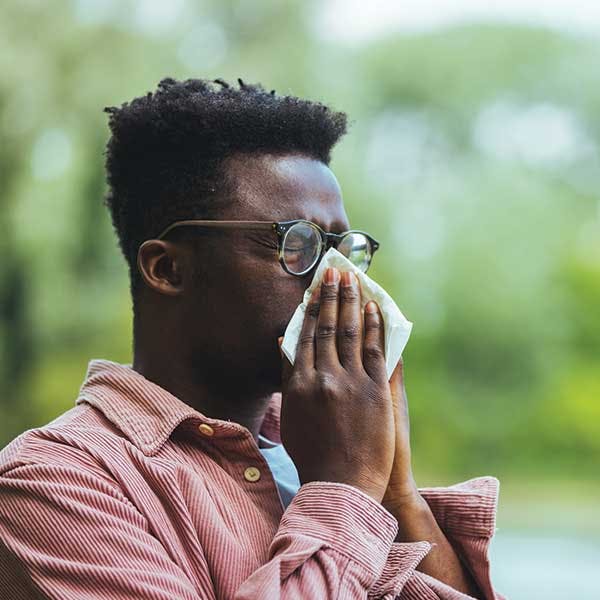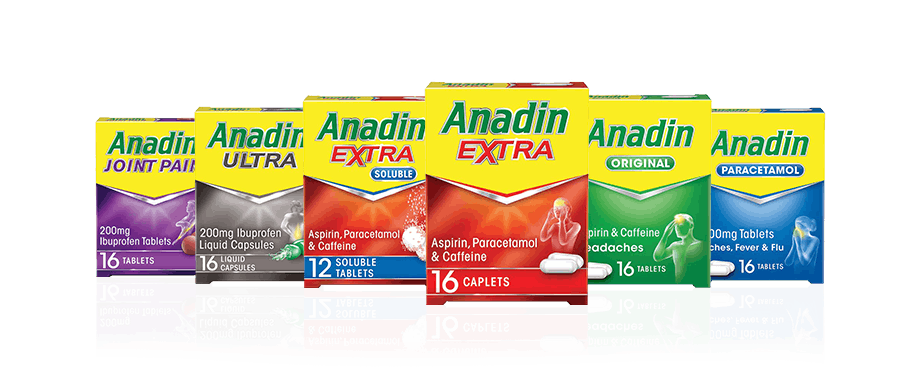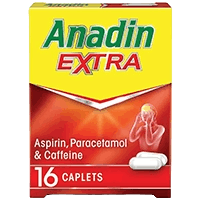Aspirin + Caffeine
Aspirin + Paracetamol + Caffeine
Anadin Extra Tablets Anadin Extra Soluble Tablets
Paracetamol
About Cold and Flu
You’re probably no stranger to the common cold as it’s one of the most common health conditions amongst adults and children. You’ll probably have more colds in your lifetime than any other illness.
On average, adults catch two or three colds per year, whereas children are prone to catching colds more frequently. Symptoms include a cough, sore throat, runny nose, and fever—the common cold can leave you feeling miserable.
Although colds and flus may seem similar, they’re not the same. A flu usually causes more severe symptoms.
The common cold and flu are both infections of the upper respiratory system, which affects the nose, mouth, throat, and lungs. Both infections are caused by viruses. There are over 200 viruses that can cause a cold; however, the flu is caused by a virus named influenza.

The Difference between Cold and Flu
If you’ve ever had a cold or the flu, you’ve probably asked yourself ‘how do I know if this is a common cold or the flu?’ The cold vs flu debate is a discussion we’ve all had at some stage throughout our lives. It can be very difficult to tell the difference between cold and flu based on your symptoms because they share many of the same symptoms. They are both respiratory conditions, however, they are caused by different viruses.
Flu tends to be more severe than the common cold, the symptoms are more intense and can sometimes lead to serious health conditions such as pneumonia, bacterial infections or hospitalisations. They usually appear very quickly, within a few hours, and they affect more than just your nose and throat. They can often make you feel so exhausted and unwell that you can no longer continue your day as normal.
Colds tend to be milder than flu and can often be treated at home. They appear gradually over time, affect mainly your nose and throat, and although they make you feel unwell, you’re usually able to continue with your daily routine.
Cold and Flu Season
Cold and flu season is referred to as the colder months of the year. Although you can catch a cold anytime throughout the year, it’s more likely during autumn/winter. Cold and flu season often begins in October and peaks between December and February. In winter people tend to stay indoors and are in close proximity of one another, therefore indoor spaces become a perfect breeding ground for viruses.
Cold and Flu Causes, Symptoms, Prevention and Treatment
What Causes Colds and Flu?
As previously mentioned, there are over 200 viruses that can cause a cold; however, rhinoviruses cause up to 50% of common colds. These viruses are spread from person to person. If the virus gets into your mouth, nose, or eyes, you will become infected. Something as simple as breathing moist air or touching a surface containing the virus can spread it around.
How can I treat cold and flu?
Unfortunately, there is no cure for the common cold or the flu. It usually disappears on its own, however the flu can sometimes make people very ill. In general, a cold requires bed rest and time for the cold to run its course and the body to heal. You can take various medication to try and help manage the symptoms, such as Anadin Paracetamol Tablets, which help lower your temperature and manage headache, sore throat, and body aches.
Try taking antihistamines to stop sneezing and a runny nose. Decongestant tablets or sprays are great for cold and flu relief, as they help relieve a blocked nose. Drink plenty of water to keep hydrated and avoid drinking alcohol or caffeine as this can dehydrate you. Speak to a healthcare professional for advice before taking any cold and flu medications.
Flu symptoms include:
- Fever above 38C
- Dry cough
- Sore throat
- Runny nose
- Muscle aches
- Tiredness
- Diarrhoea or stomach pain
- Loss of appetite
Common cold symptoms include:
- Blocked or runny nose
- Sore throat
- Headaches
- Muscle aches
- High temperature
How long do cold and flu symptoms last?
Cold symptoms generally last between 7-10 days, whereas the flu can last 5-7 days but should go away within 7 days. For people who have had a flu shot, the symptoms may last a shorter amount of time, or be less severe.
If you have a high temperature or you do not feel well enough to do your normal activities, try to stay at home and avoid contact with other people until you feel better.
How can I prevent catching a cold or flu?
There are several things you can do to avoid catching a cold, these include:
- Washing your hands regularly. Especially after going to the bathroom, before preparing food or being near someone who has a cold.
- Avoid touching your face. Colds can spread from your hands to your mouth, eyes and nose.
- Sanitise your hands regularly. If you cannot use soap and water.
- Clean surfaces regularly. The cold virus can live on kitchen/bathroom surfaces, doorknobs and more.
- Strengthen your immune system so your body can fight of germs. Get plenty of rest, regular exercise and eat well.
The best prevention method for the flu is getting the flu vaccine. The vaccine contains dead flu viruses and works by exposing your immune system to the virus, giving your body no choice but to build antibodies against the flu. Every year the NHS offer the flu vaccine, which is commonly given to people aged 50 and above, pregnant women, people with underlying health conditions and frontline healthcare workers. Please speak to your GP to enquire about getting the flu vaccine.
Could it be coronavirus?
If you have a high temperature, a new, continuous cough or a change in your sense of smell or taste, you might be infected with the coronavirus. Please follow government advice and seek medical opinion.











